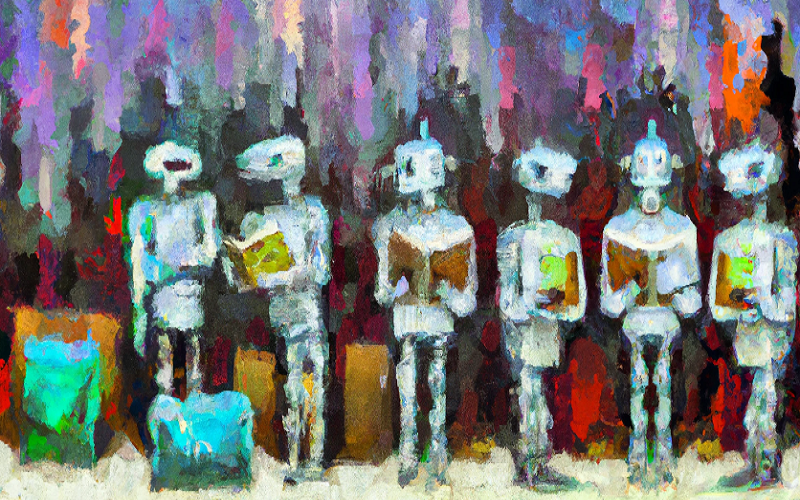AI has reshaped how we interact in every field, including creative writing. Screenwriters can use AI in multiple ways to improve efficiency, like AI screenwriting software that can create trailer breakdowns for marketing purposes. Filmmakers can also use AI to develop movie trailers for their films. Studios and marketing companies can use these reels to create trailers and other marketing materials. In the near future, we expect to see even more sophisticated AI tools that can assist writers with deeper insights into narrative structure, character development, and dialogue.
1. Generating Ideas And Outlines
Many writers use Generative AI to create prompts. Even the famous mangaka, Oda, used ChatGPT to see how it would respond if asked to create an ending for One Piece manga. Later, he said that ChatGPT came up with two story ideas and that he liked one of them. Similarly, many artists and writers have tried using Generative AIs like ChatGPT and Jasper to help them with ideas. They can also help scriptwriters decide on storylines. InStory outlines are the skeleton of stories, and setting these up is a significant progress in the writing. So, using AI can help you create effective outlines that will help you take the first step toward drafting your script. Generative AIs are also an effective way of solving writer’s block.

2. Idea Generation With Role Prompting
Generative AI can also help inspire writers with role-prompting techniques. Role promoting is a technique that can control the style of AI-generated text. Using role prompting is as simple as instructing the AI to “act like a food critic” or “act like a detective”; this can let you engage in role-play with AI and help you create realistic conversations and inspire new ideas. Role prompting is a widely used technique that helps in gaining an understanding of a type of character. It helps you to understand a character’s tone, style, and even the depth of the information presented.

3. Enhancing Character Development
Did you know that AI is used in game development to create NPCs? These days, conversations between NPCs and players appear more realistic, and their movements appear less stiff. AI is learning how to imitate humans more every day. It is also true in generative AI, which can provide insightful analysis of characters’ psychology, background, and behavior. AI might not be able to feel emotions yet, but it can imitate them, and the amount of data used to create these AIs is in the users’ hands to be taken advantage of. Character development will appear more realistic with the help of AI research data.

4. Improving Dialogue
Although dialogue can be a challenging component of writing, it can be learned and improved with practice, just like any other talent. You can use the above-mentioned role-playing techniques to observe how conversations change in tone and depth with a change in topic. You can ask AI to talk with an accent and observe how to write it using letters. AI can also gather many resources like links and videos that can help you improve knowledge on a particular field to improve the quality of dialogues. Generate AI communicates via chat, meaning it functions like a chatbot/ having a conversation. Even without prompts, you can learn many things simply by keeping the conversation with the AI running.

5. Optimizing Screenplay Formatting
AI generally comes with all the research on writing, drama schools, and more art-related topics. So, you can be sure that AI will ensure the quality of your initial draft. Script Formatter is an example of such AI. It can read your script, analyze the formatting, and improve the screenplay quality. Squibler is another well-known AI script-writing software that offers suggestions, creates story elements, helps overcome writer’s block by providing prompts and new ideas, and even creates visuals for your story. Squibler is a tool for script writing that has everything and can assist you in detail in everything from drafting to organization.

6. Spell Checking
Popular AI systems such as Grammarly, Quillbot, and others are used by many to proofread their work. AI tools have been in spell checking since 1971 when Ralph Gorin made the first spell checker in machine language. Today, many in-depth critical writing tools can analyze your text and suggest changes to optimize your spelling, tone, Grammarly, and more. AI spell checkers have been in the game for a long to make writing faster and seamless.

7. Researching Formats & Target Audiences
Many generative AI systems help conduct research easily. Jasper is the most recommended tool as it has extensive data collection built into the system. Researching formats and target audiences is an important step before writing the draft. Searching the internet and libraries for resources and background information can be excruciating and time-consuming. Generative AI makes this step easier. Many generative AIs in the market can tell you the most important things to know about your topic and even search the internet to find the most relevant information on the same screen in seconds.

8. Story Structure With AI
AI has all the basic knowledge about the history of dramas, the revolution of film, and the impact of software on films built into it. Many AI services can also search the internet and give you the best results in seconds. From the changes in story structures throughout literature to the most popular formats today, you can find all the information you need at just one site.

9. Visualizing Scenes & Creating Mood Boards
Many AIs can run through the provided script and generate AI videos. Synthesia is a popular video-generative AI that uses text and turns it into AI videos. You can use these generative video AI to make trailers or small snippets that introduce the plot and story setting for marketing and pitching purposes.

10. AI Criticisms
Criticisms or critical analysis are important for the first draft to evolve into a more complex and nuanced story. AI has excellent research skills and developed algorithms that can readily assess your script. From tone and symbolism to language use and background relevance, AI can assess the scripts in all these factors and help you review your work. AI criticisms can help you create a more prepared script before pitching it.



















